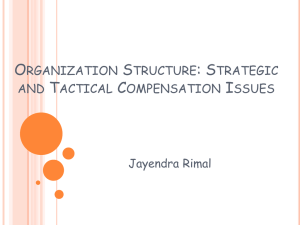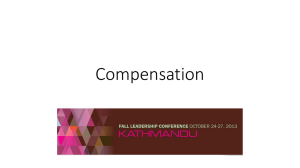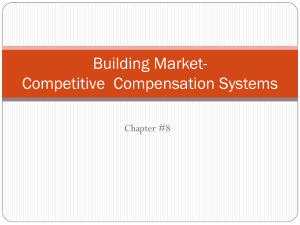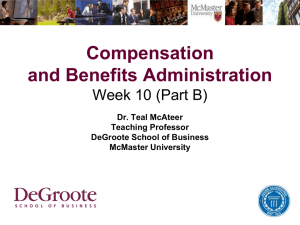components of a compensation system
advertisement
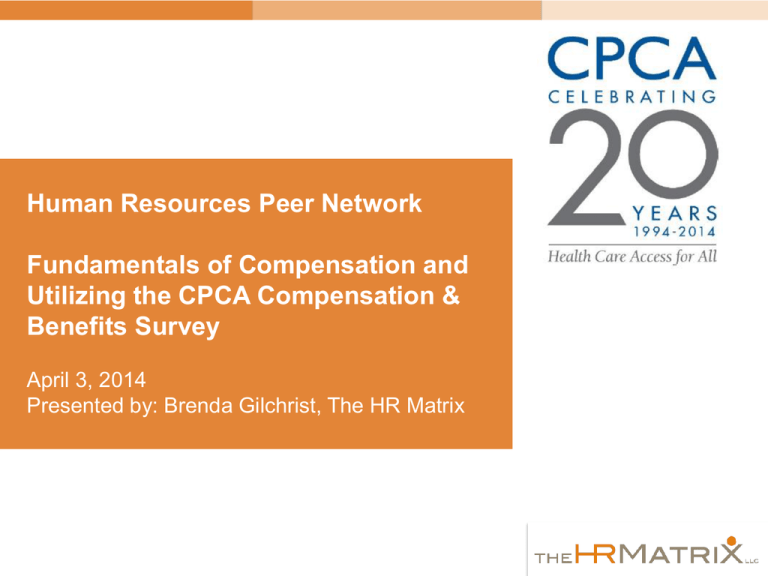
Human Resources Peer Network Fundamentals of Compensation and Utilizing the CPCA Compensation & Benefits Survey April 3, 2014 Presented by: Brenda Gilchrist, The HR Matrix OBJECTIVE LEARN HOW TO CREATE EFFECTIVE MARKET-BASED COMPENSATION PLANS AGENDA 1. How is compensation used? 2. What are the components of a compensation system? 3. What are different types of compensation? 4. How to effectively conduct a compensation study COMPENSATION IS USEDTO: • recruit and retain qualified employees. • plan and forecast budgets (CFO’s likes this!) • increase or maintain morale/satisfaction. • reward and encourage peak performance. • achieve internal and external equity. • encourage company engagement and reduce turnover PAY FOR EXCEPTIONAL SERVICE/VARIABLE PAY • • • • • bonuses commissions stock profit sharing gain sharing – 409A Regulations (Caution) Comp Study Project Plan Phase 1 Phase 2 Phase 3 Phase 4 Develop implementation plan Review job descriptions and titling (and FLSA exemptions) Conduct assessment of available survey sources Develop recommended salary structure Identify benchmark jobs for market assessment Collect and Match jobs with salary survey data Conduct interviews and focus groups Develop Compensation Philosophy Statement Review results with Compensation Committee Review draft with Compensation Committee February – March March – April April – May Slot all jobs in new structure Define pay guidelines for management of new structure June – August Sample project plan/timeline for compensation study 6 Phase 5 Communicate structure and implications to employees Distribute Individual Compensation Statements Ongoing maintenance of structure September Steps to Develop a Compensation Program Obtain Position Descriptions Competitive Assessment Salary Structure $ Note: Salary structure is illustrative. 7 $$$ 10 Survey Survey 9 8 7 Survey Survey 6 5 4 3 Survey Survey 2 1 Survey Survey Survey Survey Pay Policies COMPONENTS OF A COMPENSATION SYSTEM The Ultimate Compensation = Competitive Pay Versus the Market Recognition of Individual Differences Job Role, Responsibilities, and Skill Requirements Range within Salary Structure + Knowledge, Skills, Experience, and Performance = Total Base Pay Opportunity + Positioning in Range = Pay Competitiveness and Link to Performance “A job’s pay opportunity as defined by the market” “A person’s actual pay” 8 COMPONENTS OF A COMPENSATION SYSTEM • Job Analysis - The process of analyzing jobs from which job descriptions are developed. Techniques include the use of interviews, questionnaires, and observation. • Job Descriptions - A critical component for matching jobs against salary survey data • Job Evaluation - A system for comparing jobs for the purpose of determining appropriate compensation levels for individual jobs. Four main techniques: Ranking, Classification, Factor Comparison, and Point Method COMPONENTS CONTINUED • Pay Structures – – Standardize – Grades • Ranges • Steps $ $$$ 10 9 8 7 6 5 4 3 2 • Salary Surveys • Policies and Regulations • Communication Materials 1 DEVELOP A PROJECT PLAN • Set an objective for the program • Establish target dates for implementation and completion (be realistic on the timeline!) • Determine a budget, including the cost for a compensation consultant and salary survey data • Develop a Gantt Chart – Project Plan COMPENSATION PHILOSOPHY • Form a compensation committee - at least one executive • Decide differences in pay structures for – Executives – Professional employees – Hourly versus salaried rates – Incentive-based versus non-contingent pay • Determine whether the company should set salaries at, above, or below market. • Decide the extent to which employee benefits and/or variable pay should replace or supplement cash compensation. GATHER SALARY SURVEY DATA • Research applicable salary surveys available • Evaluate validity of survey data – is it statistically valid? • Conduct a custom survey, if needed • Pull at least 2-3 survey sources for validation • Decide who and what you want to match against – Industries? – Size; # of FTE’s, Revenue – Geography • Match position duties (not Titles!) against survey data • Compile survey data by position in xls spreadsheet DETERMINE APPROPRIATE SALARY STRUCTURE • Determine the difference between each salary step. $ $$$ 10 • Determine a minimum and a maximum percent spread. 9 8 7 6 5 • Slot the remaining jobs. 4 3 2 • Meet with the compensation committee for review, adjustments, and approval. 1 DETERMINE APPROPRIATE SALARY STRUCTURE DEVELOP SALARY ADMINISTRATION POLICY • Develop and document the general company policy. • Develop and document specific policies for selected groups. • Develop and document a strategy for merit raises and other pay increases, such as cost-of-living adjustments, bonuses, annual reviews, and promotions. • Meet with comp committee for review, adjustments, and approval. FORECASTING/BUDGETING/APPROVALS • Develop and present cost impact studies that project the expense of bringing the present staff up to the proposed levels. • Present data to the compensation committee for review, adjustment, and approval. 2013 CPCA SURVEY DATA •Which data line do you use? FTE’s or BUDGET? •What geographic area, for which positions? EXAMPLE: SURVEY DATA COLLECTION Job Title Survey Job Survey Title Source HR HRD/MG CompManager R SF HR HRD/MG CompManager R SF HR HRD/MG CompManager R SF HR HR HRM Manager Manager Survey Survey Date Dec-13 Dec-13 Variable Median 75th No. pay % No. Ees. Base Percentil Variable Pay Cos. above Salary e base Matching Criteria CPCA 2013, $10M$20M CPCA 2013, 101-200 FTE's 19 18 85,680 92,730 0% 0 16 15 85,267 92,391 0% 0 Dec-13 CPCA 2013, NorCal 18 13 73,500 80,278 0% 0 Mar-14 Northern CA, 15M, Ambulatory Health Center, Community Clinics SIC 8044, 8 years Experience NA NA 104,670 116,064 6% 6,087 Totals $349,117 $381,463 6% $6,087.00 Average Blended Rates: $87,279 $95,366 7% $6,087.00 TOTAL CASH COMP: $93,366.25 EXAMPLE: MARKET DATA/VARIANCE ANALYSIS Median Average Job Title Base Salary HR Manager 87,279 75 % Variable Pay Total Cash Comp 95,366 6,087 93,366 th Current Current Variance Current Variance Variable Total Cash Variable Base Pay Base Pay Pay Comp. Pay 90,000 1,500 91,500 Variance Total Cash Comp. 2,721 -4,587 -1,866 3.12% -75.36% -6.97% DETERMINE PAY GRADES/PAY RANGES • Establish the number of levels – – senior, junior, intermediate, and beginner for each job family and assign a grade to each level. • Determine the number of pay grades – use the salary survey data to determine SAMPLE PAY GRADES/PAY RANGES – Based on Market Salary Survey Data Pay Band Code Range Begins (mean of 1st year ee's) 10th Percentile 25th Percentile Survey Mean Annual Salary 75th Percentile 90th Percentile A1 $28,366.00 $30,729.00 $32,456.00 $35,107.00 $37,057.00 $39,377.00 A2 $31,447.00 $32,593.00 $35,517.00 $39,613.00 $43,248.00 $47,018.00 B1 $39,156.00 $41,796.00 $45,471.00 $50,391.00 $54,991.00 $59,918.00 $45,282.00 $46,305.50 $50,514.00 $56,165.50 $61,583.50 $67,193.50 $41,162.00 $47,712.00 $51,777.50 $57,318.50 $62,466.00 $67,796.50 B2 C1 D1 $58,568.00 $62,392.00 $67,472.00 $74,288.00 $80,767.00 $87,398.00 D2 $61,546.00 $66,982.00 $72,846.00 $80,584.00 $87,968.00 $95,366.00 E1 $68,538.00 $71,423.50 $77,982.50 $86,545.00 $94,945.00 $103,316.00 SAMPLE PAY GRADES/PAY RANGES XYZ COMPANY SAMPLE Pay Bands - BASED ON MARKET DATA Exempt Pay Bands Band Minimum Midpoint Maximum G $44.6 $59.4 $74.2 F $35.3 $47.0 $58.8 E $32.5 $43.3 $54.1 Non-Exempt Pay Bands Band Minimum Midpoint Maximum D $34.6 $43.3 $52.0 C $29.5 $36.9 $44.3 B $24.4 $30.5 $36.5 A $19.2 $24.0 $28.8 COMMUNICATE PROGRAM TO MGRS/STAFF • Present the plan to the compensation committee for feedback, adjustments, review, and approval. • Make a presentation to executive staff managers for approval or change, and incorporate necessary changes. • Create the communication materials • Make presentations to managers and employees. • Design and develop detailed systems and procedures • Execute the program. LET’S PRACTICE – IN TEAMS FORM TEAMS OF 5-6 COMPONENTS OF A COMPENSATION STUDY The following resources that should be used to conduct an organization-wide compensation study COMPENSATION PHILOSOPHY LETTER FROM CEO EMPLOYEE FAQ 1 EMPLOYEE FAQ 2 AGENDA FOR MANAGERS MEETING JOB ANALYSIS INVITATION INSTRUCTION SHEET FOR JOB ANALYSIS PROCESS NON-EXEMPT TASK LOG EXEMPT TASK LOG SALARY SURVEY SOURCE SPREADSHEET SURVEY RESULTS XLS VARIANCE ANALYSIS XLS PAY BANDS CUSTOM SURVEY COVER CUSTOM SURVEY INDIVIUDALIZED COMPENSATION STATEMENT FINAL PHASE MEMO TO ALLSTAFF FINAL PHASE MEMO TO MANAGERS ROLL OUT POWERPOINT PRESENTATION JOB EVALUATION APPROVAL FORM (for New positions) MONITOR • Monitor feedback from managers AND employees • Make changes where necessary • Find flaws or problems in the program and adjust or modify where necessary

